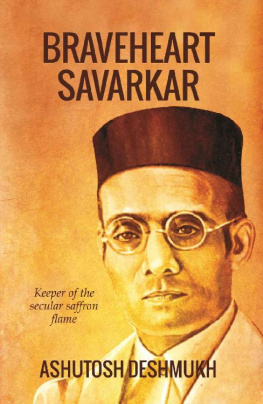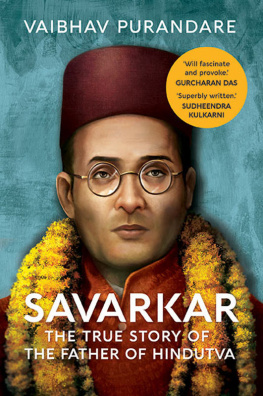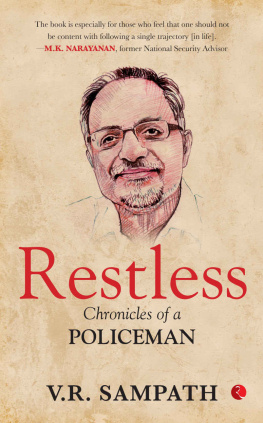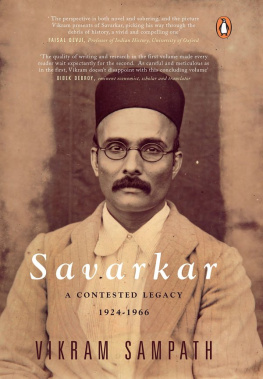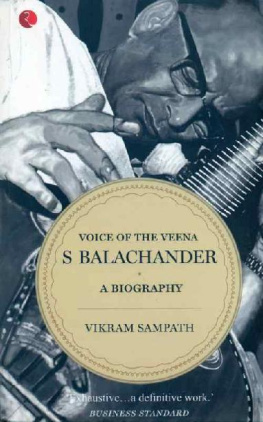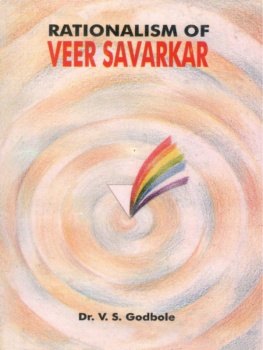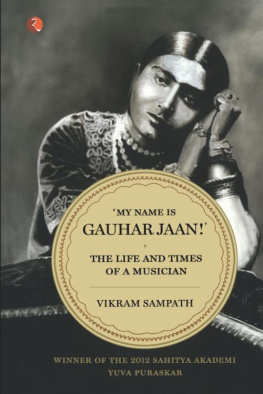Sampath - Savarkar: echoes from a forgotten past, 1883-1924
Here you can read online Sampath - Savarkar: echoes from a forgotten past, 1883-1924 full text of the book (entire story) in english for free. Download pdf and epub, get meaning, cover and reviews about this ebook. year: 2019, publisher: Penguin Random House India Private Limited, genre: Home and family. Description of the work, (preface) as well as reviews are available. Best literature library LitArk.com created for fans of good reading and offers a wide selection of genres:
Romance novel
Science fiction
Adventure
Detective
Science
History
Home and family
Prose
Art
Politics
Computer
Non-fiction
Religion
Business
Children
Humor
Choose a favorite category and find really read worthwhile books. Enjoy immersion in the world of imagination, feel the emotions of the characters or learn something new for yourself, make an fascinating discovery.

- Book:Savarkar: echoes from a forgotten past, 1883-1924
- Author:
- Publisher:Penguin Random House India Private Limited
- Genre:
- Year:2019
- Rating:5 / 5
- Favourites:Add to favourites
- Your mark:
- 100
- 1
- 2
- 3
- 4
- 5
Savarkar: echoes from a forgotten past, 1883-1924: summary, description and annotation
We offer to read an annotation, description, summary or preface (depends on what the author of the book "Savarkar: echoes from a forgotten past, 1883-1924" wrote himself). If you haven't found the necessary information about the book — write in the comments, we will try to find it.
Sampath: author's other books
Who wrote Savarkar: echoes from a forgotten past, 1883-1924? Find out the surname, the name of the author of the book and a list of all author's works by series.
Savarkar: echoes from a forgotten past, 1883-1924 — read online for free the complete book (whole text) full work
Below is the text of the book, divided by pages. System saving the place of the last page read, allows you to conveniently read the book "Savarkar: echoes from a forgotten past, 1883-1924" online for free, without having to search again every time where you left off. Put a bookmark, and you can go to the page where you finished reading at any time.
Font size:
Interval:
Bookmark:



PENGUIN BOOKS
 PENGUIN BOOKS
PENGUIN BOOKSGenerally, there is consensus in a country about its great men and women, allowing some people to make a few critical comments on him or her. It is rather an exception that opinion in a country gets to be so divided so as to cause a complete polarization, with some at one pole admiring a person as a messiah, a trailblazer; and others, on the other, denouncing him as an ogre, an embodiment of evil. And which pole dominates depends on the supervening sociopolitical and cultural atmosphere of the country. When nether pole dominates, it takes a lot of courage on the part of an author to buck the trend and seek the truth.
Vinayak Damodar Veer Savarkar (18831966) was such an exceptional person. And Vikram Sampath has proved to be such a courageous author. In fact, when I undertook to write a biography of Dr Shyama Prasad Mookerji, incidentally a close associate of Savarkar, I came across similar feelings; I went ahead notwithstanding, claiming no credit for any courage, certainly not of the kind that Vikram has shown.
For Savarkar was a much more maligned person than Dr Mookerji. While the onslaught on the latter was more by way of omission than commission, Savarkar had been directly and personally accused of complicity in Gandhijis assassination; he had also been falsely accused of begging for mercy to be released from the hellhole otherwise known as the Cellular Jail in the Andamans, of whipping up hatred against Muslims and Christians, and so forth... Therefore, writing a biography of Savarkar would take more courage and the most painstaking research possible to rubbish the accusations thrown at him. This Vikram has been able to do admirably, plumbing the depths of material on him not only in English but also in Savarkars native Marathi.
Vikrams command of the English language, his writing skills and his penchant for description, especially of the inhuman torture that the prisoners had to undergo at the hands of the unspeakable Scottish jailor Barrie make the text both heart-wrenching as also very readable. The book covers his life up to about 1924 and leaves the reader waiting impatiently for the remaining part of his lifepossibly the most productive phasewhen he crystallized his concept of Hindutva, put it into practice and got Dr Mookerji to second for him at a time when his health had begun to fail. Although the two parted company later, it was Savarkars philosophy that got his second to take it onwards and found a new party, the Bharatiya Jana Sangh, which later metamorphosed into the Bharatiya Janata Party, which has just come to power at Indias centre with a decisive majority
Tathagata Roy , governor, Meghalaya, Raj Bhavan, Shillong
Because of his opposition to the Congress and the belief that he was complicit in the assassination of Mahatma Gandhi, historians of independent India have tended to ignore the life of V.D. Savarkar. This is the first of a two-volume biography based on formidable research in hitherto unconsulted documents in Marathi and in archives across the world. It explores, as never before, the formation of the young revolutionary who was to create the doctrine of Hindutva. This is a key work for understanding the development of ideas dominant in Indian politics today
Prof. Francis Robinson , Royal Holloway, University of London
The first serious biography of Savarkar in English, this book allows us to understand a man whose ideas have come to define contemporary India. A long overdue study, and one full of new material, it heralds a welcome departure in the scholarship on Indian political thought
Prof. Faisal Devji , professor of Indian history, University of Oxford
Based on extensive research, Vikram Sampath provides a gripping narrative of the first half of the life of an anti-colonial revolutionary turned ideologue of Hindutva. Sampaths biography delves into Savarkars formative influences in Maharashtra, his camaraderie with radicals in England and France, and his suffering as a prisoner in Andaman. We get a rich portrait of Savarkar as a poet and writer as well as political activist and theorist
Prof. Sugata Bose , Gardiner professor of history, Harvard University
Vikram Sampaths book is not limited to providing mere biographical details of the life of Savarkar, but offers historical context through detailed descriptions of historical events of that era. Thus, it makes a dual contribution to Indian history. The author staggers Savarkars biography with details of the sinister British rule in India, which gave rise to powerful nationalist leaders of multiple stripes during the early phase of the Indian independence movement.
The book fulfils a long overdue prerequisite for an authentic historical biography of a brave son of India. It examines the life of Savarkar closely, while also providing lesser-known details, which help dispel the many mythical accounts of Savarkars life. As a corollary, this book also supplements our existing patchwork of knowledge on the history of Indian independence.
Sampaths is both a biographical work as well as a historical book on one of the most misunderstood nationalists of India. This book brings forward, for the first time, an authoritative examination of material (letters, speeches, official communication, newspaper reports) and numerous never-before-studied documents.
The book begins with the birth of Savarkar, narrating events of his childhood and young adult life in the first few chapters interspersed with thought-provoking details of the political circumstances of India. Through the depiction of successive struggles of young Savarkar in plague-affected western India between 1899 and 1900, the author demonstrates the struggles of average Indians under British rule. With Savarkars move to Nashik from 1900 onwards, his nationalist activities gained momentum as he founded Mitra Mela (also its affiliate Rashtrabhakta Samuha). Savarkars activities and entanglements with the national movement here pitted him against British authorities, and at times brought him in opposition to established national leaders including Tilak. Crucial is Savarkars decision to champion the celebration of Shivaji Utsav during this early phase. Savarkars brilliant speeches inspired numerous young nationalist leaders, while the British government used these speeches to prosecute him on charges of sedition many year later. Of utmost interest are the chapters discussing the life of Savarkar in London (including his short stint in Paris) followed by his imprisonment in the Andamans and later in India. Sampaths rich prose brings history to life with amazing clarity.
The book makes a most valuable and original contribution to historical scholarship on the Indian independence movement. It also makes important modifications to the hitherto established views on the independence movement, giving a new and critical analysis of the events. His study infuses Indias independence movement with the necessary complexity, which has remained too simplistic for far too long due to missing information. Sampath offers a consciously alternative narrative of Indias independence that is representative of her numerous trials and tribulations.
Font size:
Interval:
Bookmark:
Similar books «Savarkar: echoes from a forgotten past, 1883-1924»
Look at similar books to Savarkar: echoes from a forgotten past, 1883-1924. We have selected literature similar in name and meaning in the hope of providing readers with more options to find new, interesting, not yet read works.
Discussion, reviews of the book Savarkar: echoes from a forgotten past, 1883-1924 and just readers' own opinions. Leave your comments, write what you think about the work, its meaning or the main characters. Specify what exactly you liked and what you didn't like, and why you think so.

